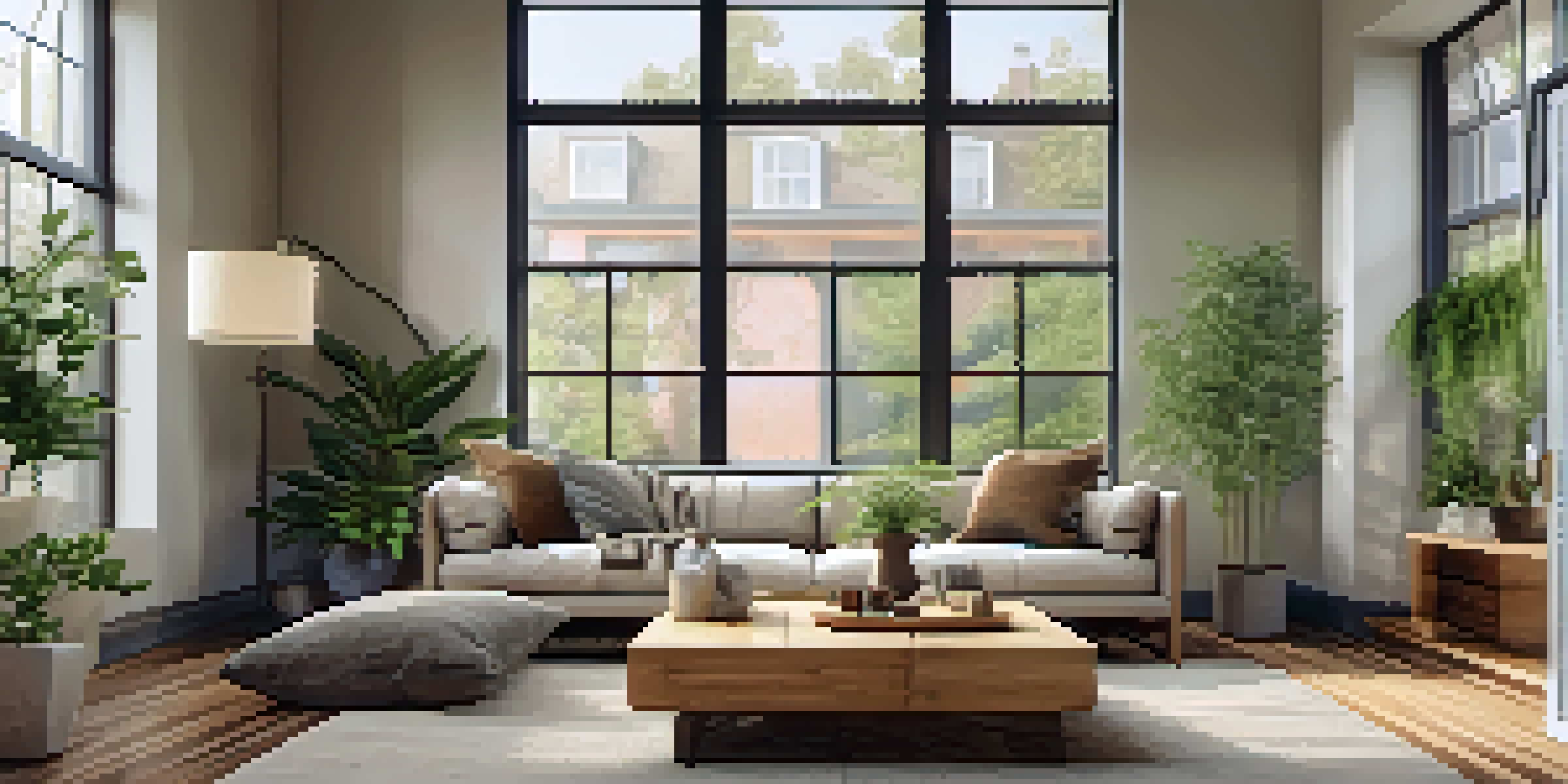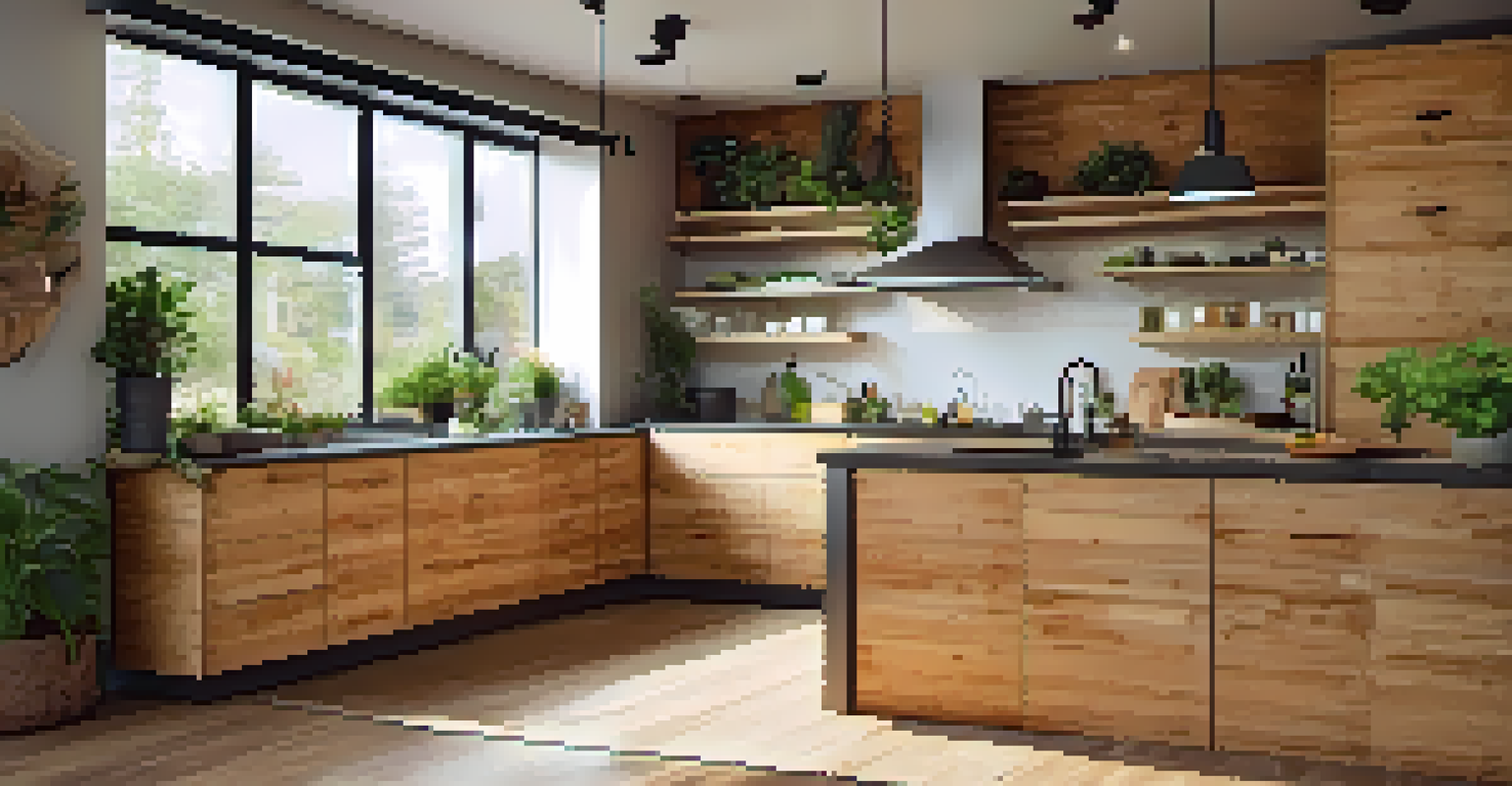The Benefits of Plant-Based Materials in Home Renovations

Understanding Plant-Based Materials in Renovations
Plant-based materials refer to products derived from renewable resources, such as wood, bamboo, and cork. These materials are increasingly popular in home renovations due to their sustainable nature. Unlike traditional materials, which often rely on fossil fuels, plant-based options offer a more eco-friendly alternative.
The greatest threat to our planet is the belief that someone else will save it.
Using plant-based materials means supporting sustainable forestry practices, which help maintain healthy ecosystems. For instance, bamboo grows quickly and can be harvested without destroying the plant, making it an ideal choice for flooring or cabinetry. This not only reduces waste but also promotes responsible sourcing.
Incorporating these materials into your home renovation can lead to a healthier living environment. Many plant-based options are free from harmful chemicals, making them a safer choice for your family. As more homeowners prioritize eco-conscious choices, plant-based materials are becoming a go-to option.
Eco-Friendliness: A Key Benefit of Plant-Based Materials
One of the standout benefits of plant-based materials is their minimal environmental impact compared to conventional materials. For example, traditional concrete and steel require significant energy to produce, whereas plant-based options often require less energy and emit fewer greenhouse gases. This makes them a compelling choice for eco-conscious renovators.

Additionally, many plant-based materials are biodegradable or recyclable, reducing the amount of waste sent to landfills. When renovations are completed, you can rest easy knowing that your choices contribute to a circular economy, where materials are reused rather than discarded.
Eco-Friendly Benefits of Plant Materials
Plant-based materials offer a sustainable alternative that reduces environmental impact and supports healthier living spaces.
By opting for plant-based materials, homeowners can significantly reduce their carbon footprint. This choice not only benefits the planet but can also inspire others in the community to consider more sustainable practices in their renovation projects.
Aesthetic Appeal of Plant-Based Materials
Beyond their environmental benefits, plant-based materials offer unique aesthetic qualities that can enhance the beauty of your home. For instance, bamboo flooring provides a warm, inviting look that complements various interior styles. The natural grain patterns found in many wood products bring a sense of warmth and character to spaces.
Sustainability is no longer about doing less harm. It's about doing more good.
Furthermore, plant-based materials can be easily customized. From the finish on a reclaimed wood countertop to the color of a hemp-based paint, choices abound. This versatility allows homeowners to express their personal style while also making eco-friendly choices.
Incorporating plant-based materials can create a harmonious connection between indoor spaces and the natural environment outside. This biophilic design approach fosters a sense of well-being and tranquility, making your home not just beautiful, but also a welcoming sanctuary.
Durability of Plant-Based Options
Many people might assume that plant-based materials are less durable than their synthetic counterparts. However, this is a common misconception. For example, bamboo is known for its strength, often outperforming traditional hardwoods in durability.
When properly treated and maintained, plant-based materials can withstand the test of time. Items like hemp insulation and cork flooring are not only durable but also resistant to mold and pests, making them excellent choices for long-lasting home renovations.
Aesthetic and Customizable Options
These materials not only enhance the beauty of homes but also allow for personal expression through various styles and finishes.
Investing in quality plant-based materials can lead to lower maintenance costs over the years. By choosing durable options, homeowners save money in the long run, as they won't need to replace or repair materials as frequently.
Health Benefits of Plant-Based Materials
Health considerations are becoming increasingly important in home renovations. Plant-based materials often contain fewer harmful volatile organic compounds (VOCs) compared to synthetic materials. This means that by choosing them, homeowners can improve indoor air quality and create a healthier living environment.
For instance, natural paints and finishes made from plant-based ingredients can significantly reduce toxins in your home. This is particularly beneficial for families with children or individuals with allergies, as it minimizes exposure to harmful chemicals.
Moreover, the natural properties of many plant-based materials can help regulate humidity levels. This contributes to overall comfort and can even enhance the longevity of your home furnishings and finishes.
Cost Considerations for Plant-Based Materials
While some might think plant-based materials are more expensive, the initial investment can often pay off in the long run. Many of these materials are durable and low-maintenance, leading to cost savings over time. Additionally, the increasing popularity of plant-based options has driven prices down, making them more accessible for homeowners.
Moreover, many local governments and organizations offer incentives for using sustainable materials in home renovations. This can further offset costs and encourage homeowners to make eco-friendly choices without breaking the bank.
Durability and Cost-Effectiveness
Investing in quality plant-based materials can lead to long-term savings due to their durability and low maintenance needs.
It's also worth considering the potential for increased home value. Homes that incorporate sustainable features and materials often attract more buyers in today's market, making plant-based renovations a smart investment.
How to Source Plant-Based Materials Effectively
Finding quality plant-based materials for your renovation can be an exciting journey. Start by researching local suppliers specializing in sustainable products. Many companies now offer a wide range of options, from flooring to cabinetry, all sourced responsibly.
Online marketplaces and eco-friendly home improvement stores have also emerged, providing convenient access to plant-based materials. Be sure to check for certifications, such as Forest Stewardship Council (FSC) approval, which ensures responsible sourcing and sustainable practices.

Lastly, consider repurposing and upcycling materials from local sources or second-hand shops. This not only saves money but also adds a unique touch to your home, making it truly one-of-a-kind while keeping sustainability at the forefront.